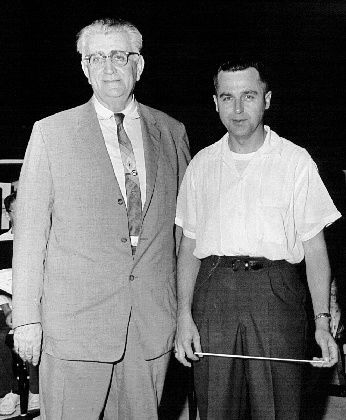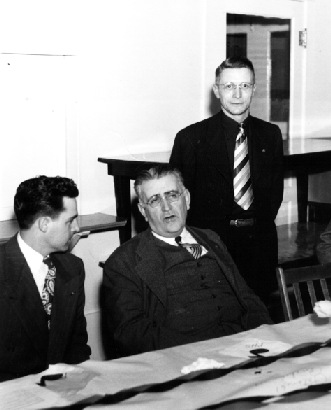 |
Max Whitlock |
 |
Max Whitlock |
Following a concert of the South Hamilton High School band in which the Samson March was performed, Carl Pray, who had brought Mrs. Karl King to the concert, told me that he would write me about how the Samson March got its name. This is a portion of his December 9, 1975 letter:
In the summer of , I believe, 1927, we were playing several weeks of fair engagements. In those days, the King Band had a full camp outfit and carried our own cook so we were able to be together in the smaller towns where there were no hotel accomodations. There were four of us who travelled by truck from job to job, and we set up the camp and then moved it to the next job.
This time we had two days to get from Jefferson Ia. to Rock Rapids, Iowa. In those days we had dirt roads and a truck that would not go more than 15 miles per hour downhill with the wind. At any rate, we had no spare tire and between Jefferson and Rock Rapids we had seventeen blow-outs. Each time we had to call the owner of the truck and he would bring out a new tire.
We got into Rock Rapids about 5:30 PM just as the band had finished the afternoon show of the first day. Everyone pitched in to get the camp set up before the night show started. I put a big crate of army cots on my back and carried them over to the tent where we slept. They were quite heavy and Karl saw me and reprimanded me for carrying too heavy a load. He said, "What are you trying to do, a Samson Act?"
The next morning after breakfast he wrote the march and that afternoon we played it. He dedicated it to me and many times when we played it, he would ask me if I had carried any cots lately.
Alonzo Leach ran a music store in Des Moines for many years. He once told me that in a train station out west he read an ad in Variety magazine that said that the Karl's band with the Buffalo Bill Cody Show was looking for a flute and piccolo player. The ad said that interested flute players should apply to Karl King in Denver, Colorado. Wanting the job but being in a hurry to catch a train, Alonzo bought a penny post card and used it to apply for the job by writing I play flute and piccolo. He got the position with the band, but it was several years before he felt he knew Karl well enough to ask him about that post card application. Alonzo said, In those days we players didn't fraternize often with the band conductor.
He told Karl, I've been meaning to apologize for applying for that job with just a penny postcard. Afterwards I felt awfully bad because that was no way to apply for a job. I'm curious why you hired me.
Karl replied, I heard from lots of applicants about that job, but I didn't have time to go through page after page of papers most performers sent me telling how good they were and what they had done. I wanted someone who could play flute. Your post card said you could play flute and so I hired you.
When Karl was a young man conducting Buffalo Bill Cody Show band, he had other duties with the travelling show. Everyone did several jobs to keep the outfit going. Karl's other job was to work in the mail car to help distribute mail to all show personnel. At that time there were quite a few Native American Indians travelling with the show, and occasionally there would be mail for them. Not knowing how to communicate with them in their native tongue, Karl asked Bill Cody how he should handle the situation because he couldn't understand a word the they said. Bill had him memorize a phrase that he should say the next time a native came for mail. It wasn't too long before Karl got a chance to use his new language skills, but when Karl recited the memorized phrase, the native seemed to get quite upset. After several tries at handling mail call in this unsuccessful manner, Karl returned to Mr. Cody and told him, The Indians don't seem to like it when I tell them what you told me to say. What does that mean, anyway?
Bill Cody replied, It means, "Who the hell would send mail to an Indian?"

Karl King - Max Whitlock
1959
Following a concert where several King numbers were performed, a spectator commented, I liked the first two numbers but didn't care for that third one (Trombone King).
Standing nearby, Karl overheard the comment and replied, That's all right. I only got $15 for the damn thing anyway.
I called Karl's home from the Mid Bell store in Ft. Dodge because I wanted Karl to hear Hosts of Freedom, the openning selection on a new record of my South Hamilton Band. Ruth answered the phone and said that Karl would like to see me but that I shouldn't stay too long because he was not well. Karl came out in his robe and played the recording. I asked him if he recognised the march.
He answered, Yes, and I know the 18 year old boy who wrote it!
A story of two March Kings
Karl King had written and dedicated a march to his friend, Henry Fillmore. He titled this march, King Henry.
Fillmore was the guest conductor of the bandmasters band at an Iowa Bandmasters Convention held at Roosevelt High School in Des Moines. King Henry was programmed, and while rehearsing this march, we saw Fillmore turn to King who was seated nearby and say, Someday I'll dedicate a march to you, Karl.
After Fillmore died, it was discovered that a march dedicated to Karl had been written but had not yet been published. At an American Bandmasters Convention in Florida, Karl King was surprised to be called out of the audience to conduct the premier performance of King Karl King. (download Fillmore's King Karl King (mp3).

Max Whitlock - Karl King - Frank Casey
1948
When we were having a special Lions Club meeting in Paton in 1948, I had invited two guest speakers, Karl King from Fort Dodge, and Frank Casey, Simpson College's Basketball Coach and Athletic Director.
It was a tradition for the Paton Lions Club to sing America to start their meetings. For this April 6 meeting, however, no piano player had been secured and this was discovered only when the meeting began and there was an awkward pause as we all waited for the piano to be played. There was relief and some surprise when Karl strode up to the piano and began the tune for us.
Several King marches were performed at Karl's funeral in 1971. Ruth King was asked if some of Karl's marches were going to be played at her funeral.
If not, I ain't comin'! she said.